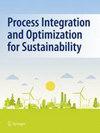隧道氧化物钝化接触(TOPCon)和钝化发射极及后接触(PERC)太阳能电池能量产量比较研究及垂直光伏最佳安装方法分析
IF 2.1
Q3 ENERGY & FUELS
Process Integration and Optimization for Sustainability
Pub Date : 2024-04-23
DOI:10.1007/s41660-024-00408-4
引用次数: 0
摘要
本文章由计算机程序翻译,如有差异,请以英文原文为准。
Comparative Study on Energy Yield of Tunnel Oxide Passivated Contact (TOPCon) and Passivated Emitter and Rear Contact (PERC) Solar Cells and Analysis of Optimal Installation Method for Vertical Photovoltaics
求助全文
通过发布文献求助,成功后即可免费获取论文全文。
去求助
来源期刊
CiteScore
4.30
自引率
8.30%
发文量
82
期刊介绍:
This journal is an interdisciplinary platform for information on innovation, research, development and demonstration in the areas of resource conservation, optimal use of various resources, analysis and optimization of various systems and processes, reduction and mitigation of environmental pollutions, and overall sustainable developments. It provides an international forum to researchers, policy makers, decision makers, managers, consultants, and planners to publish, learn, and discuss about various aspects related to Process Integration and Optimization. The breadth of coverage ranges from various optimization and system analysis methods (such as mathematical programming, pinch analysis, P-graphs, heuristics based approaches, decision analysis, fuzzy optimization, etc.) to applications, innovations, and methodological developments for resource conservation. This journal publishes the following types of contributions:Original research papers that propose novel methodologyReview articles providing surveys and critical appraisal of developments in a specific topic of interestShort communications describing initial research findings of potential significance, or substantive comments on previously published papersShort technical notes that focus on the implementation of established methodology (e.g., industrial case studies/success stories; software tools)PIOS does not accept experimental optimization papers based on statistical techniques, unless such results are integrated from a process system perspective.

 求助内容:
求助内容: 应助结果提醒方式:
应助结果提醒方式:


